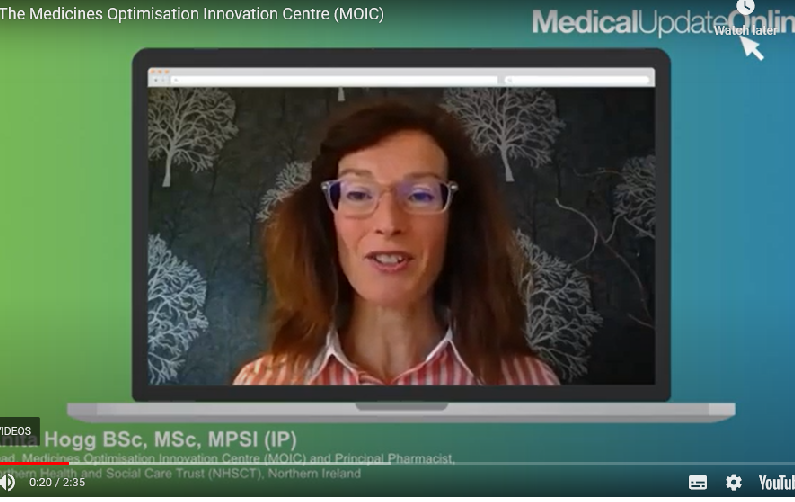
by Edel O'Sullivan, | Nov 20, 2020 | News Release, Press
Anita Hogg Principal Pharmacist MOIC recently spoke to the Medical Update Online regarding the work of the Medicines Optimisation Innovation Centre (MOIC) in Belfast and how we helped to ensure reliable provision of critical care drugs during the covid-19 pandemic.
Estimating the critical care drug requirements in response to the COID-19 pandemic was an important task. Faced with a global emergency in which health care systems worldwide were doing their utmost to scale up resourcing and capacity to manage the pandemic, MOIC staff realised that increased demand for drugs, especially critical care drugs would be a major issue. Drug supply and demand in a pandemic such as this is complex because there is a massive increase in demand coupled with a degree of urgency generated by anxiety about the availability of drugs for critical care. “There was a lot of media attention around medicines to help ventilation and where they were going to come from”, says Ms Hogg.
View Anita’s interview in full below:
https://youtu.be/YONrKoBsunU

by Edel O'Sullivan, | Nov 5, 2020 | News Release, Press
Optimising patient medication outcomes whilst minimising harm through the innovation and management of multiple medicines.
Today (5 November 2020) marks the launch of a 3 year €3.5 million cross-border project designed to transform the approach to optimisation of medicines in the three project jurisdictions.
Funded by the European Union’s INTERREG VA Programme, managed by the Special EU Programmes Body (SEUPB), ‘iSIMPATHY’ aims to ensure the optimal outcomes with medication use in those patients with more than one long-term illness. It will enable eligible patients to live healthy and active lives by supporting both them and clinicians in defining and achieving realistic goals of drug treatment through medicine reviews.
The project partners are Scottish Government, NHS Scotland, Northern Health & Social Care Trust, Medicines Optimisation Centre (MOIC) in Northern Ireland and the Health Service Executive in the Republic of Ireland. Scottish Government, Effective Prescribing and Therapeutics is the lead partner.
Ministers from the three project jurisdictions joined health professionals, public and third sector partners from Ireland, Northern Ireland and Scotland to announce the project launch at a virtual event held today.
Cabinet Secretary for Health and Sport Scotland Jeane Freeman said:
“The iSIMPATHY initiative illustrates how we can work together to improve health and wellbeing, reduce health inequalities and still ensure the best use of health and care resources.
“I am proud that patient tools and learning developed in Scotland will be shared and implemented across the three project areas to support patients in the self-management of long-term conditions. I look forward to attending this virtual launch event.”
Minister Robin Swann, Department of Health Northern Ireland said “I am delighted to welcome today’s launch of the iSIMPATHY project. The original SIMPATHY project is a shining example of what can be achieved by working together across national boundaries to share experiences, best practices and practical tools to implement polypharmacy management programmes across Europe.
“Tackling inappropriate polypharmacy and ensuring the appropriate use of multiple medicines has been identified as a key priority for governments around the world by the World Health Organisation. With our aging population, it becomes ever more critical for European countries to work together in a focused way to manage and prevent inappropriate polypharmacy, and deliver better patient outcomes.”
Minister Donnelly of the Department for Health Ireland said “I am delighted to see that we are partnering with colleagues in Scotland and Northern Ireland, who have been world-leaders in tackling the challenges of polypharmacy and adherence and medicines optimisation respectively. This presents a real opportunity for Ireland to accelerate its work in this important area. Ensuring that every patient receives the optimal treatment and care is an absolute priority. This will help people to live healthy and active lives and reduce the need for hospital admissions. I am therefore very pleased to see the introduction of this timely initiative and look forward to seeing its outcomes.”
Outlining the importance of the project, Gina McIntyre Chief Executive of the SEUPB said: “This project will meet important targets within the health and social care objective of the EU’s INTERREG VA Programme. This is a very important part of the programme, which has created many new and innovative cross-border partnerships, similar to iSimpathy, who are working across Northern Ireland, Ireland and Scotland.
“By sharing knowledge, expertise and experience these partnerships are having a huge impact upon the health and well-being of tens of thousands of citizens. They are pushing boundaries, creating new and highly innovative ways of working and are helping to positively transform healthcare, for many years to come.”
Scottish Government Project Lead Alpana Mair said “I’m delighted we have now launched the iSIMPATHY project which builds on our previous EU funded project, SIMPATHY. This will ensure for patients with multimorbidity, their medication outcomes are optimised while minimising any harm. By placing the patient at the centre of the intervention and by involving them in the decision making about their medication, the aim is to support shared decision making, whilst also gaining their feedback to inform policy. Through this approach, we specifically want to focus on health inequalities to address inappropriate polypharmacy and adherence.”
From late 2019 to September 2022, iSIMPATHY will train health care professionals, across the three jurisdictions, to deliver 15,000 effective medicine reviews. The project will deliver the key principles of the WHO Third Global patient safety challenge, Medication without harm.
It will be implemented and operational in Northern Ireland, Scotland and the border region of Ireland. Through cross-border shared learning, the project will develop a systems approach that is scalable.
Match-funding for the project has been provided by the Departments of Health in Ireland and Northern Ireland as well as the Scottish Government.
ENDS
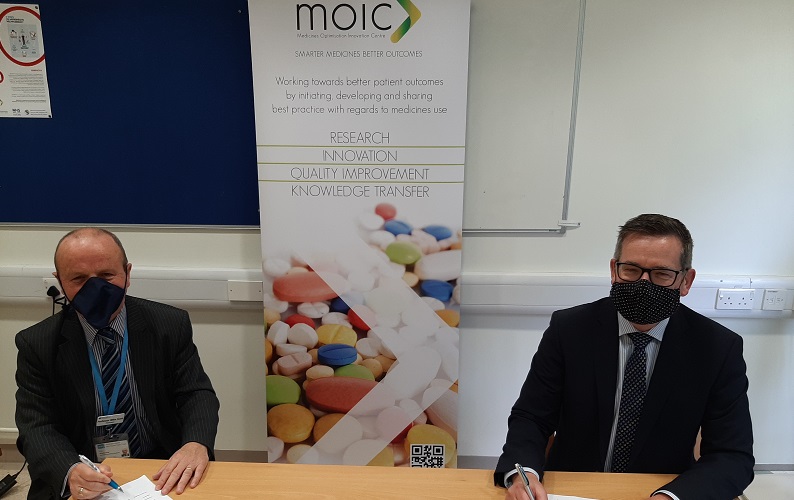
by Edel O'Sullivan, | Oct 22, 2020 | News Release, Press
The Medicines Optimisation Centre and Northern Health and Social Care Trust have today signed a Memorandum of Understanding with the Polish Society of Clinical Pharmacy in order to share learning and drive Pharmacy services throughout Europe.
Memorandum of understanding (MOU or MoU) is an agreement between two or more parties outlined in a formal document. It is not legally binding but signals the willingness of the parties to move forward together.
Northern Ireland is leading the way in pharmacy in Europe and The Medicines Optimisation Innovation Centre is recognised as a driving force in Europe and globally in medicines optimisation, forming strategic partnerships within health and medicine.
and medicine.
Seamus O’Reilly Medical Director Northern Health and Social Care Trust
“This MOU is a symbol of the level of collaboration between the countries and is a mutual agreement that we will work together to improve medicines safety and medicines optimisation in Europe. It is an opportunity to learn from each other and bring those benefits directly to our patients here in the Northern Health and Social Care Trust
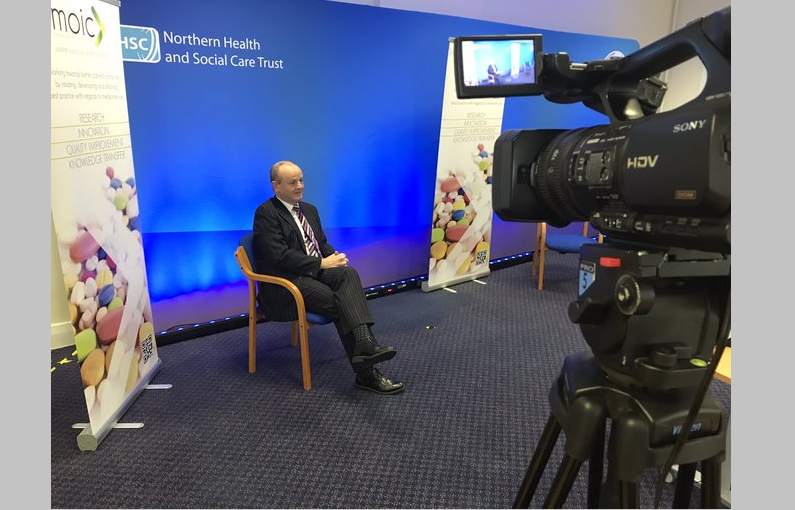
by Edel O'Sullivan, | Oct 16, 2020 | News Release, Press
This event was a first for Northern Ireland and showcased examples from a range of EU partners of how Northern Ireland is co-operating and working cohesively throughout Europe to deliver safer and more effective medicines use.
Medicines safety is a global priority. The Medicines Optimisation Innovation Centre is recognised as a driving force in Europe and globally in medicines optimisation, forming strategic partnerships within health and medicine.
Keynote speakers included Robin Swann MLA Health Minister Northern Ireland, Jennifer Welsh Chief Executive Northern Health and Social Care Trust as well as speakers from Poland, Estonia and the Republic of Ireland discussing how we are all collaborating to improve medicine safety in Europe..
View the event in full below.
EU Regions Event from MOIC on Vimeo.
Available Resources
WHO Patient Safety Challenge
Northern Ireland Pharmacy Response to Covid 19
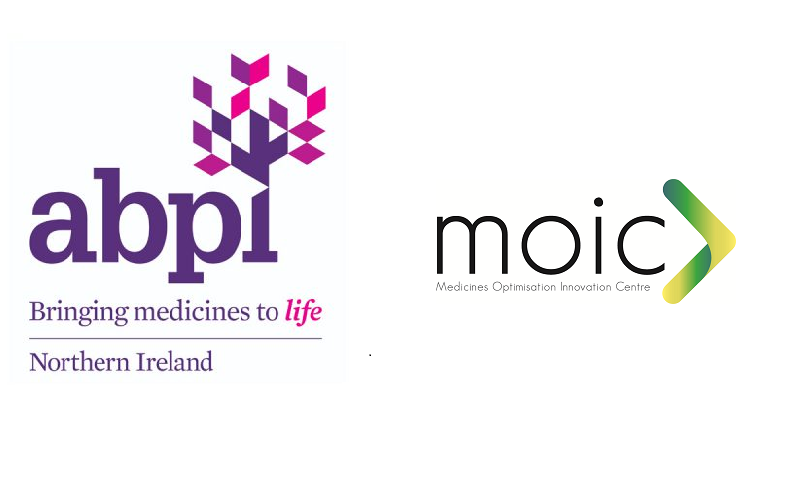
by Edel O'Sullivan, | Oct 8, 2020 | News Release, Press
Northern Ireland’s Medicines Optimisation Innovation Centre (MOIC) and The Association of the British Pharmaceutical Industry (ABPI) have announced a new partnership to deliver ‘triple win’ benefits to patients, NI Health and Social Care (HSC) and the economy.
Starting with the bold aim of eradicating Hepatitis C in Northern Ireland, the organisations will put in place a new framework to improve patient access to the latest treatments, make more effective use of HSC resources and increase cross-sector medical research.
The partnership agreement signed by MOIC and the ABPI will create a new process whereby HSC will look to industry to help tackle major health challenges which can be addressed by innovative treatments.
Industry will also be able to propose new approaches to unmet health need, which can then be rapidly rolled out across Northern Ireland. One of the first areas the partnership will tackle is Hepatitis C, known as the ‘silent epidemic’ because many sufferers do not know they are infected and therefore do not seek treatment.
Hepatitis C can cause serious liver damage, cancer, and premature death. Incidence is on the rise in Northern Ireland, with cases increasing by 53% in 2019 against the previous ten year average. Untreated, the disease is associated with major costs and productivity losses, estimated for the UK at between £210-£427 million by 2035.
However, a new generation of treatments known as direct acting antivirals can cure the condition, creating a real hope that it can be eradicated as a public health challenge. Maximising access to these treatments in Northern Ireland will is key to delivering that goal and will be an early focus of the new ABPI-MOIC partnership.
Mike Scott, Director of MOIC said:
“We have a long-standing positive relationship with the ABPI and look forward to the benefits that our new partnership will bring. “I’m delighted that tackling Hepatitis C will be one of our first goals. In 2016, the UK signed up to the World Health Organization Global Health Sector Strategy on Viral Hepatitis, which commits participating countries to eliminate the disease as a major public health threat by 2030. We believe our new partnership with the ABPI will help create the conditions for NI to exceed that target.”
Cathy Harrison, Chief Pharmaceutical Officer NI said:
“The Department of Health welcomes the new partnership between MOIC and the ABPI. We believe it will ensure that collaboration is focused on where it can add most value in making innovation as widely available to patients as possible.”
Colette Goldrick, Director ABPI Northern Ireland and NHS Engagement said:
“Cross-sector partnership agreements have already proved effective in GB, and we are delighted to be working with MOIC to bring the same benefits to Northern Ireland.
“Our partnership with Greater Manchester for example has already led to three substantial projects in the fields of Hepatitis C, cancer, and cardiovascular disease, matching NHS needs with industry offers. We want to do the same in Northern Ireland.”
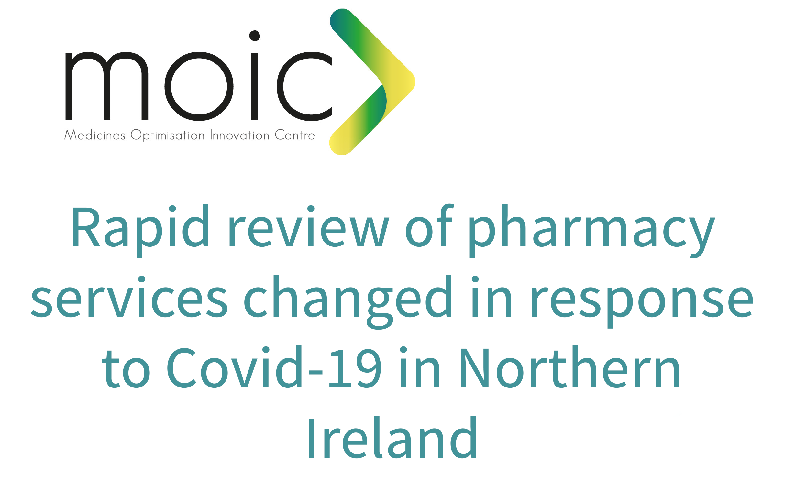
by Edel O'Sullivan, | Sep 24, 2020 | News Release, Press
MOIC complied this report and captured the changes to pharmacy services that were implemented in the Health and Social Care (HSC) service in Northern Ireland during the first wave of the Covid-19 pandemic, between March and May 2020.
It describes the wide range of interventions by pharmacy teams that were necessary to ensure that patients and the public had access to medicines and pharmaceutical care throughout the emergency.
The review makes a number of recommendations for actions needed to prepare for future waves of the pandemic and inform changes needed to support the longer term rebuilding of HSC services.
To view the report in full click here.







